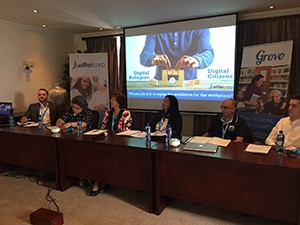
A mature and responsible relationship between humans and technology will bridge the digital skills divide in both the workplace and the educational spaces and in so doing will guide people from digital refugees to digital citizens.
This was one of the topics of conversation at a technology gathering in Johannesburg, Gauteng recently. The roundtable, which included six panel experts, was rallied to find solutions around the digital skills gap in the workplace.
Speaking on the back of the discussion, Stefan du Plessis, commercial director at Eiffel Corp, said "Technology alone is not a solution for twentieth century problems. People need to take responsibility for their own learning to prove their need in the workplace vs automation and software already part of almost all jobs. Digital literacy should be embedded in the curriculum from a very young age. If we don't innovate fast enough, the digital divide is going to get wider and wider and people without access will be left behind," he said. For technology to result in productivity, implementation is key, Du Plessis added.
Implementation though was another matter of contention with some panel members stating that one of the biggest challenges includes a lack of knowledge. "It's not technology that's the problem - it's the human who is expected to adapt to a social system they don't know how to navigate and who is then alienated from the work and seen as lacking skill when they are not in fact lacking," said Dr Felicity Coughlan, director of Independent Institute of Education (IIE) and Group Academic Director for ADvTECH.
"The terms digital immigrant and native are inappropriate," she added, "because they locate the understanding only in people and there are young people with skills deprived of technological opportunities and vice versa. It is far more complicated than a generational issue."
Dr Irene Lubbe, Head Education Consultant, Department for Education at the University of Pretoria, echoed the same sentiments, adding that many educators and employers were themselves not digitally literate. "Digital literacy is the responsibility of schools, higher education institutions and the workplace. Unfortunately some teachers and employers are not familiar with the wide variety of applications available on the Internet and are therefore not digital literate and subsequently cannot guide the learners or students."
It is for this reason, concluded Tim Genders, CEO of Project Isizwe, that despite SA initially voting against Internet access as a basic human right, free access to WiFi has shown to address inequality in people. "The Internet has to be seen as a basic utility, like water and electricity; mobile is a cup, free Internet is the water, of which people can empower themselves," he said. In conclusion the panel resolved that to develop the workforce with digital skills, management buy-in is essential and obviously IT support.
Share